Children and their “musical intifada” prevail at Qalandia
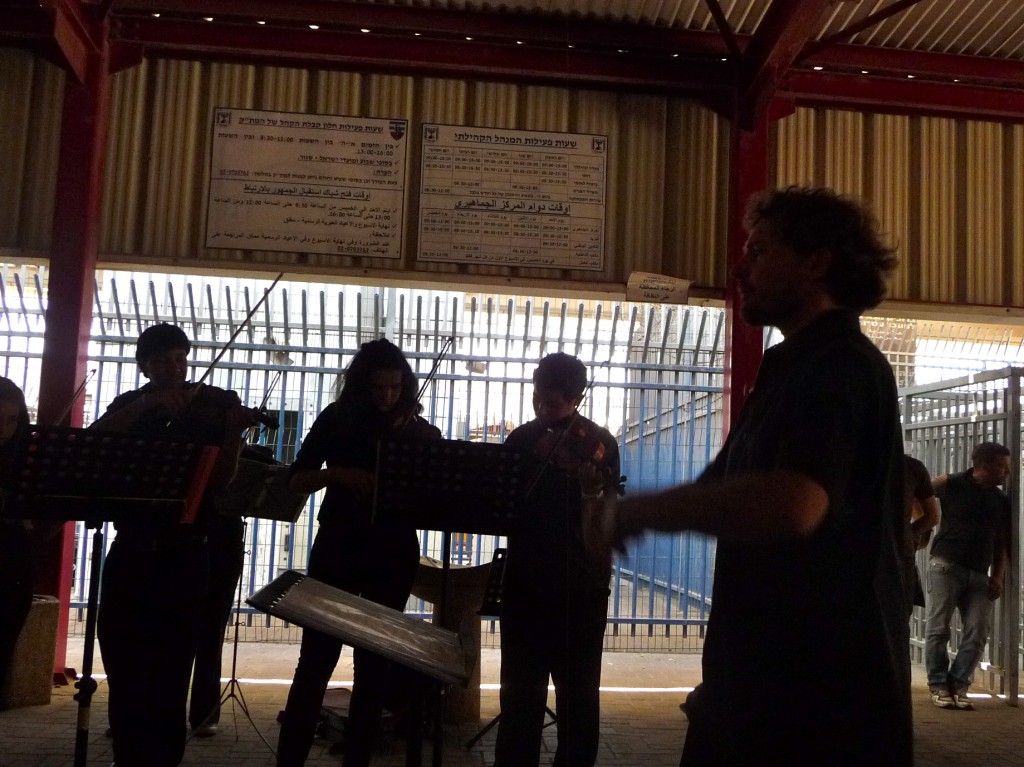
Jason Crompton, conductor of the Al Kamandjati youth orchestra, silhouetted in front of the bars at Qalandia military checkpoint. (To listen, click on "Symphony No. 6," or near "Bizet's Farandole," below.)
The operation was planned well in advance, and down to the last detail. Target: Passenger terminal at Israel’s Qalandia military checkpoint, near the entry cage where every day, hundreds of Palestinians cross to Jerusalem. Time of day: High noon, June 23rd, 2011. Operatives: More than two dozen Palestinian children. Weapons: molded wood, metal string, curved brass. Known co-conspirators: Georges Bizet, Wolfgang Amadeus Mozart. “This is a musical intifada,” declared Ramzi Aburedwan, founder of the Ramallah-based Al Kamandjati (The Violinist, in Arabic).
In truth the operation was not without risk. Jason Crompton, an American pianist who conducts Al Kamandjati’s youth orchestra, and a couple of his colleagues had come to Ramzi with the idea. They’d heard about a similar Al Kamandjati event at the separation wall a few years ago. But they all knew that Qalandia, defined as “Area C” under the ill-fated Oslo accords, is under full Israeli military control. Setting up a Palestinian orchestra in an Israeli military zone – just steps from the steel corridors, revolving metal gates, and X-ray machines where Palestinians submit themselves for inspection – was an uncertain prospect. How would the soldiers react? If they forced the children to stop playing, and Palestinians watching this objected, what would happen next? Would the situation get out of control?
A few Al Kamandjati staffers were nervous, and a couple of parents had called with their concerns. Nevertheless, everyone seemed on board with the plan: It was a way to confront the 44-year-old occupation by reclaiming space through music.
The operation began swiftly and according to plan. At about 11 a.m. in Ramallah, the 30-some members of the youth orchestra began piling onto the bus, carrying their violins, cellos, trombones and clarinets. Into the belly of the bus went snare drums, cymbals, timpanis, backpacks and sheet music.
We rolled south out of Ramallah. Ramzi stood at the front of the bus and faced the musicians.
He designated a half dozen of the older students and staffers for early logistics: As soon as we arrived at Qalandia, these six would quickly assemble the music stands and mount the large percussion. For the rest, “you stay on the bus. Please don’t go out. We don’t want to attract any attention. Once the stands and the big instruments are ready, everybody come with his music, his instrument, and we’ll start immediately. If you can tune on the bus, that would be amazing.”
What if the soldiers come and order the children to stop playing? “We don’t listen,” Ramzi said. “Exactly as if they are not there. If they say something on the loudspeaker, we don’t listen. We produce sound. That’s it.” He added, hopefully: “Normally at this time there will be more people there. Which is gonna make it more safe, yani.”
“Enshallah,” I said. God willing.
Just past Lovely Toys, the wall and checkpoint towers came into view. The bus swung left through a roundabout, and then right, into the parking lot. Ramzi ran off to find Jason, who had come in a car with two dozen music stands.
The early logistics team assembled the percussion and music stands, according to plan. There they stood, black metal sentries in the hot sunlight outside the “passenger terminal,” out of the range of military surveillance cameras.
Nearby, through the open windows of the bus, came the sounds of children tuning their instruments.
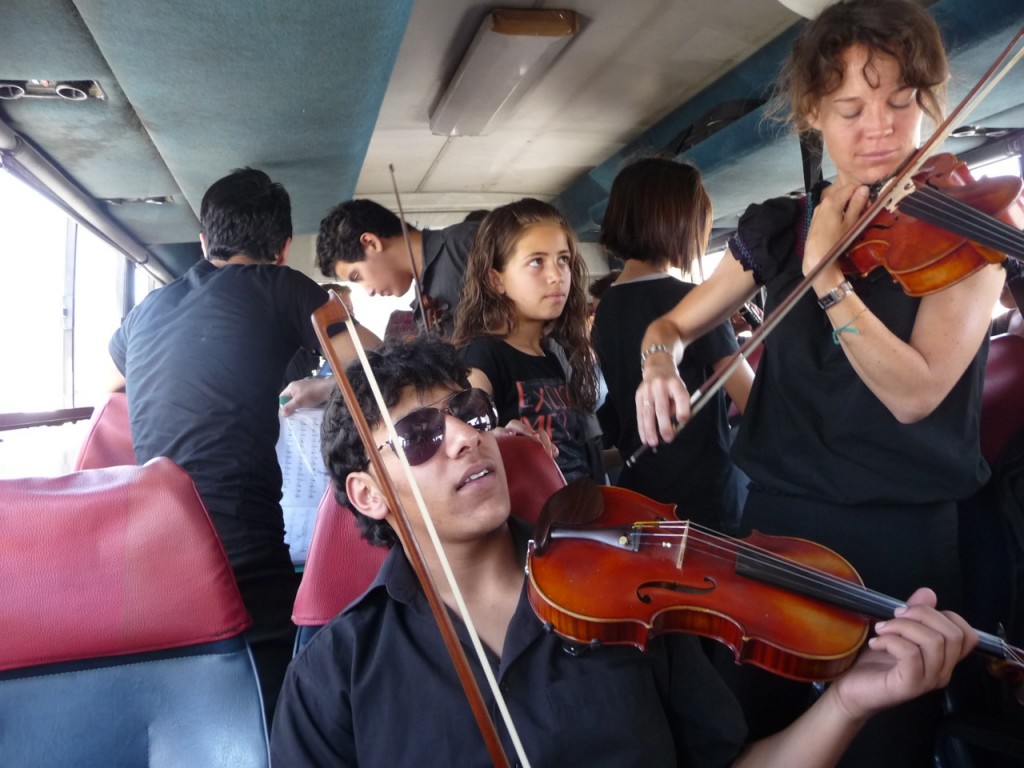
Tuning on the bus: Mahmoud Karzoun, 18, and members of the Al Kamandjati youth orchestra, moments before they played at the Qalandia military checkpoint.
And then it started. In two lines, from the front and back bus doors, the young musicians filed out, their instruments out of their cases and ready. Ramzi directed them to the side of the building, where they were to grab a music stand and enter the terminal.
They strode determinedly past the red metal benches and toward the far corner of the terminal, in front of a long row of blue horizontal bars. On the other side, in a small building behind bulletproof glass, soldiers seemed unaware of the unfolding musical drama.
Now Jason stood, arms raised, before the musicians – about 25 kids, and perhaps 8 teachers. The orchestra was poised, bows and brass in position.
The sound of Mozart’s Symphony No. 6 in F Major filled the terminal.
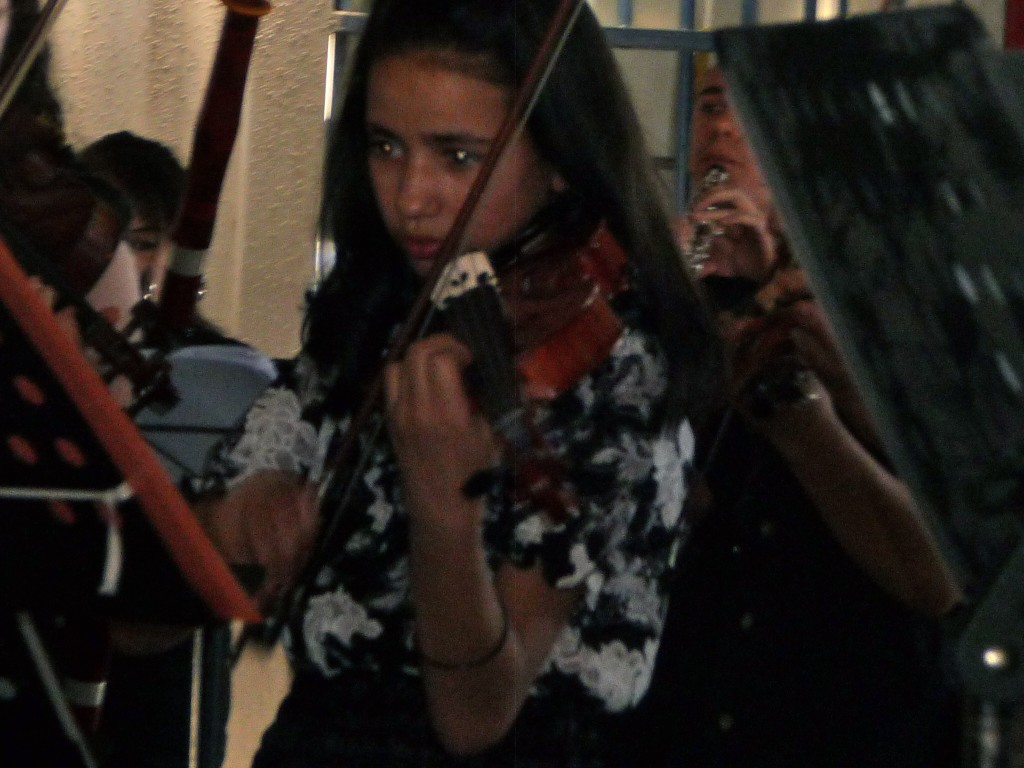
Alá Shehaldeh, 13, a violinist in the Al Kamandjati youth orchestra, playing Mozart at Qalandia on June 23. "This was the best concert of my life," she said afterward.
Immediately people stopped, stared, and smiled in amazement. They came closer, pulling out cell phones and snapping photos. Soon perhaps a hundred people were gathered around the Al Kamandjati youth orchestra, transfixed. “People were listening fully,” Ramzi would say later. He was playing viola. “The crossing stopped.”
Helen Sherrah-Davies, a visiting violinist from the UK, remembers having to fight back tears as she played. “I wonder how many times joy has entered that space,” she would muse afterward.
At first the soldiers seemed to pay no attention. But as the Mozart symphony built – Allegro, Andante, Minuet, and the Allegro last movement – they started to take notice. By the time the orchestra launched into Georges Bizet’s Dance Boheme from Carmen #2, a soldier appeared, looking out through the bars.
He was joined by a second, then a third. One of them got on his radio. They didn’t seem to know what to do. Now Bizet’s Habanera (also from Carmen) was echoing through the terminal.
This was all rather out of the ordinary. But the soldiers seemed to be aware that trying to stop the music would have created a mess – and an opportunity for a global Youtube event.
In the end, the orchestra played on, reprising Bizet’s Farandole [listen here: bizet2] from L’Arlesienne Suite No. 2, to triumphant applause. [hear more Bizet, with applause: bizet2ptwithapplause]
For a long moment, the cheering surged. A feeling of euphoria hung over the reclaimed space. The players looked at each other in amazement.
Sweat beaded up on Jason’s forehead, the result of his energetic conducting. Now he was facing the cameras. “Do you think the music can make a solution for peace between the nations?” a Palestinian reporter wanted to know. “I wish it were that simple, really,” Jason said with a laugh. “I don’t know if it can bring a solution but I think it can bring a lot of good things to people. It brings really great things to these kids here. And to be a part of that, I can’t ask for anything more, really. It’s amazing. To play here today – I feel so good.”
Back at the bus: a sense of jubilation. In the parking lot, Jason went window to window, jumping up to yell gleefully to the kids, who responded each time with whoops and screams.
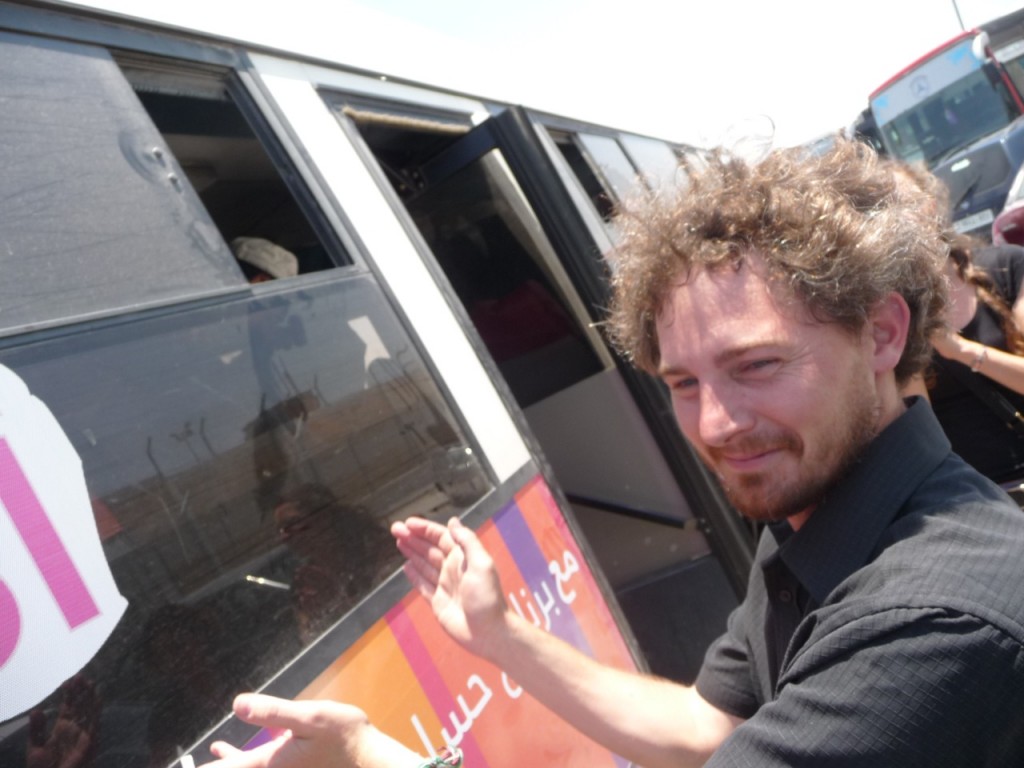
Jason Crompton celebrates at the bus in the Qalandia parking lot, moments after the youth orchestra finished their concert at the checkpoint.
We headed back to Ramallah, to the sound of much singing, tabla and oud. “This was the best concert of my life,” said Alá Shehaldeh, a 13-year-old violinist. Not so long ago, at a checkpoint, Alá was forced to open her violin case and play a song before the soldier would let her pass.
Now, Alá looked out of the bus window at the landscape of Palestine, a peaceful and uncomplicated smile resting on her face.

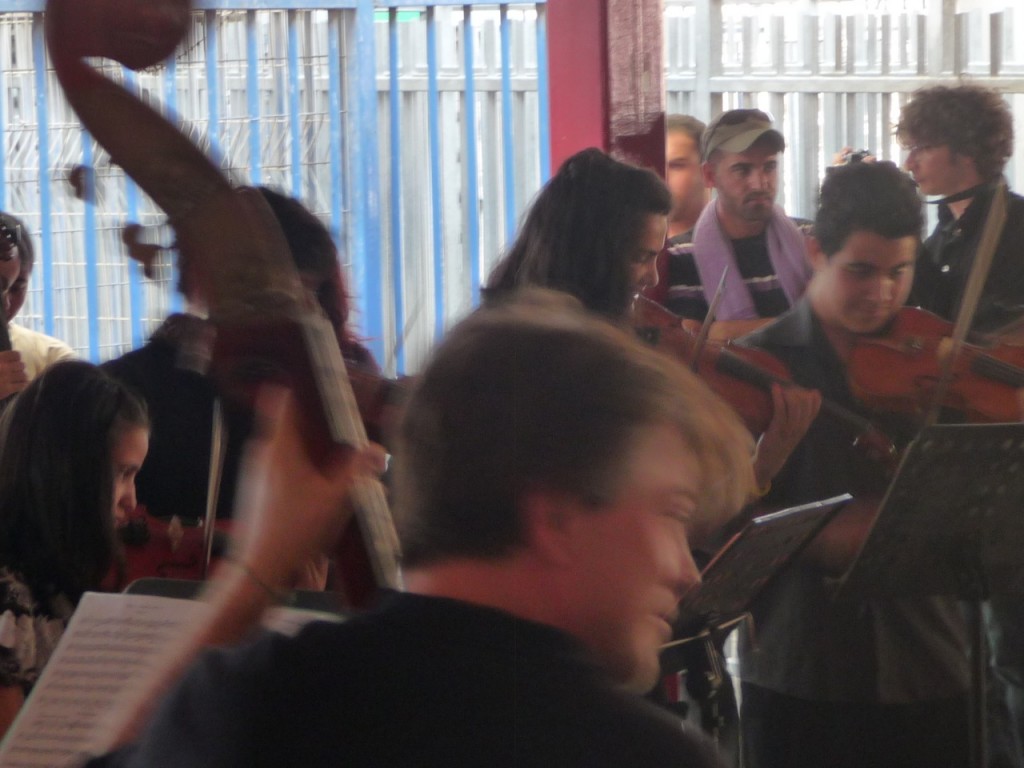
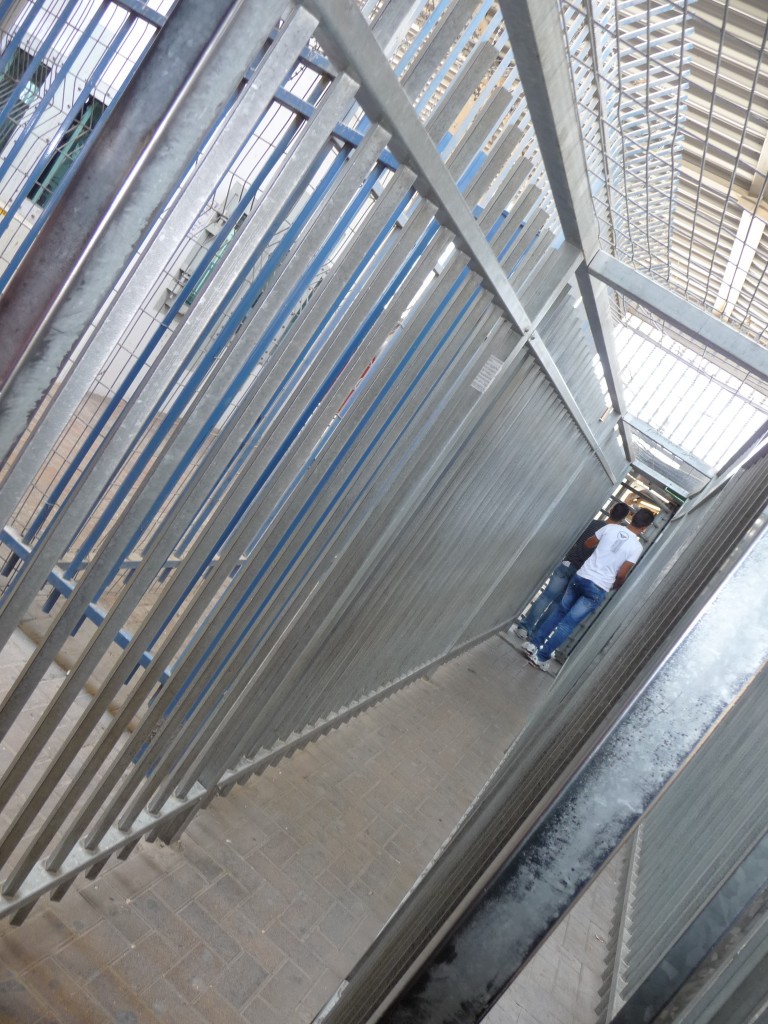
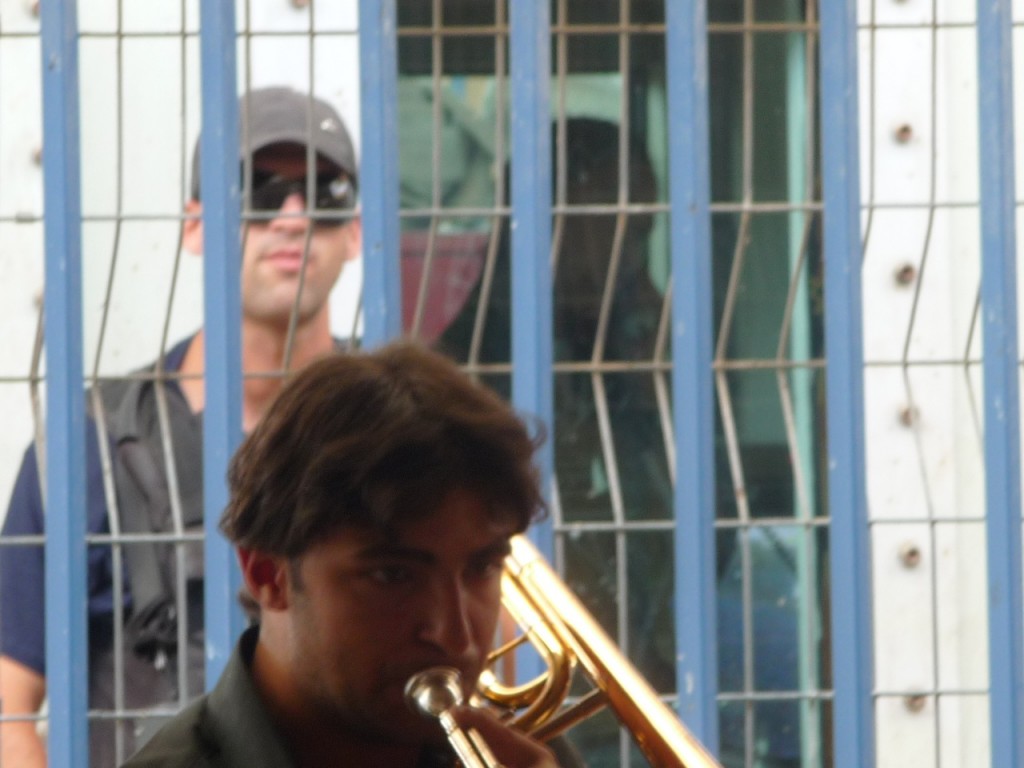
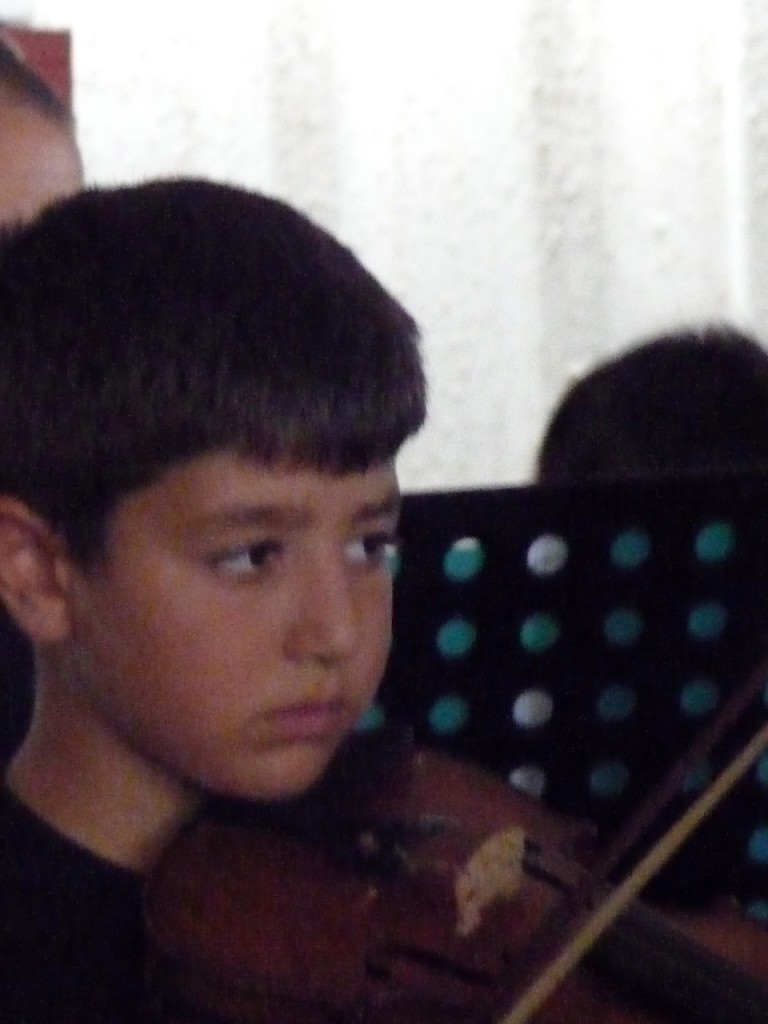

Wonderful!! “Praise the Lord! Praise him with trumpet sound; praise him with lute and harp! … Praise him with clanging cymbals! … Let everything that breathes praise the Lord!” (Psalm 150).
Thank you Sandy, cheers to you, your writing and Al Kamandjati!
Euphoric energy is felt here in Laguna Beach, California.
If understanding and music be food for peace in the world, we all must play on.
>> RoHa: What! Netanyahu lied?>> Bibi: As for Jerusalem, only a democratic Israel has prcoetted freedom of worship for all faiths in the city.According to this thread’s article, Palestinians were prevented from entering Jerusalem. This doesn’t mean that the freedom of worship for all faiths already in the city aren’t prcoetted.So, technically at least, he didn’t lie. He just fudged the truth. 😉
wow. thanks for being part of this sandy – reading your post I could hear the music and thanks to you, see those beautiful children. Music is indeed the voice of our hearts.
wiping yes after blinking rapidly – way to go – power of persevering community, and brave hearts willing to stand for what you believe in, and the POWER of music to trancend barriers….. this blog is an amazing glimpse – THANKYOU so much for sharing with us
Thanks for this, Sandy. I’m so sorry I wasn’t able to stay and witness it firsthand. btw have emailed Munther about starting that conversation. We shall see what we shall see..
Oh, Sand! I can hear the Mozart and see the children’s faces all the way in Flagstaff,
Arizona. Blessings. Mare
Tears came to my eyes reading about the exquisite reclamation of power and dignity at the degrading dusty checkpoint through the illumination of the joy of music and the courage of children.
It’s a great story. This is building peace. with courage and dignity. A story that had to go all around the world in the front pages, open the TV news shows. But we only are served with the other side of the story: the violence. Thanks Sandy. I would like to share this with my people in facebook but I don’t find a way in this page. I sure pressed the “like” link.
My ideas exactly!
wonderful…simply wonderful
congratulations to everyone involved for their superb musicianship but especially for their bravery
30th september 2011